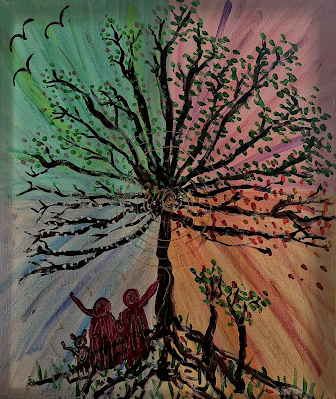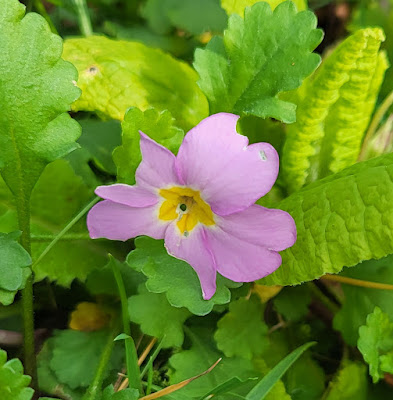 |
| "In the Beginning" - (c) Sally Coleman. With permission |
Now the LORD God had planted a garden in the east, in Eden; and there he put the man he had formed. The LORD God made all kinds of trees grow out of the ground—trees that were pleasing to the eye and good for food. In the middle of the garden were the tree of life and the tree of the knowledge of good and evil. (Genesis 2)
Now I don’t believe in a literal Garden of Eden – an actual historical place in time, where God made Eve out of Adam's spare rib and a talking four-legged snake roamed the trees looking to trap the unwary But I do believe in the Garden of Eden. Its truths are so much easier to grasp, I find, if you get yourself out of the realm of archaeology and dodgy science and enter the world of our dreams and ideals.
Adam’s in the perfect place. But, even though God is there with him, it’s not the perfect place without Eve. Adam has to have company.
Then the LORD God made a woman from the rib he had taken out of the man, and he brought her to the man.
The man said,
“This is now bone of my bones and flesh of my flesh;
she shall be called ‘woman,’ for she was taken out of man.”
And they’re in a garden. Not a farm. The difference? In a farm you have to work to live. In a garden, work is a choice. They’ve got it easy, Adam and Eve. The fruit is just hanging on the trees. There’s no back-breaking ploughing. They just have to remember not to go for the low-hanging fruit. It's easier, but it's the last to ripen.
And we can get the feeling of that beauty. I can find it in a decent drift of primroses in long grass - that combination of human effort (planting, managing the mowing, cross-breeding, if you've got some primula x polyantha) and God's wonders (the snows in winter, the warmth, the breezes and the sunshine, etc). It all adds up to a hint of heaven to me.
I'm intrigued by the paradox that seems to say that physical activity is good for you - as long as you don't have to do it. So we're encouraged to be active and not to sit down too much, for the good of our hearts - but jobs that include lots of physical activity and standing up are apparently bad for your health. It's like the choice, and the control matter. And so a garden is a place where you can grow food - if you want - at your leisure.
And Adam and Eve only had one rule to live by. Just imagine. The ease of it. I had to obey the Highway Code all the way to Tesco yesterday. And that's got hundreds of rules. Some of which that cyclist pointed out to me when I helped him down off the bonnet. But Adam and Eve just have one. Don’t eat fruit from one particular tree.
And at that point, if you’re my age and background, you’re thinking of the Father Ted episode, “Flight into Terror”. Fatherr Dougal has been invited into the cockpit of an airliner. And there’s a big red button with a sign that says “Do not Press”. And we all know what is going to happen next.
So enter on all fours a talking snake. And a fruit is eaten.
Adam and Eve should have trusted God for their lives. But they chose the Tree of Knowledge, which they thought would make them like gods.
And they should have been walking with the Lord in the cool of the day, when he drops in like a neighbour, and instead they're hiding from him, frantically stitching up fig leaves, in case he should see anything hanging out.
The closeness to God is removed - the blight has entered - the garden is now a wilderness which you have to sweat at and burn to turn into a farm. Every beautiful flower has a petal nibbled by a slug. And they can't do anything about the bindweed.
And the story has played out for the whole of human history.
But we have a race memory of Eden. The Greeks believed in a "Golden Age" which declined through silver, bronze etc to the "Iron Age". The Buggles - remember them - moved us one step further along to the Plastic Age.
And because we live in an age of plastic, not Eden, we're left with an unfulfilment. A yearning. A longing after the perfect - which we never quite attain because we are mortal and this world is not the perfect one we can imagine. And no political campaign will achieve perfection, because they're all driven by failing humans.
As a teenager I knew the spiritual yearning of the natural world, or of the ancient monuments still littered around the English landscape, the stones and barrows - the sense of there being something that I couldn't quite touch, brooding behind it all. Up on Dunstable Downs - if you can get away from the folk who sit in their cars, looking out over their dashboards towards the Vale of Aylesbury - out with the Five Knolls and the oddness and the wind and the sun setting down somewhere to the right of Ivinghoe Beacon - that's where you can know something of it. The Rollright Stones at 7.30 on an October morning, coming up to Samhain. They creep across and nudge you and tell you about it. The roar of the sea, and the pebbles being dragged back out. They tell you that they wouldn't be far off what you're looking for. If it weren't for the sewage.
Reading CS Lewis's "Suprised by Joy" I recognised this experience.
As I stood beside a flowering currant bush on a summer day there suddenly arose in me without warning, and as if from a depth not of years but of centuries, the memory of that earlier morning at the Old House when my brother had brought his toy garden into the nursery. It is difficult to find words strong enough for the sensation which came over me; Milton's 'enormous bliss' of Eden (giving the full, ancient meaning to 'enormous') comes somewhere near it. It was a sensation, of course, of desire; but desire for what?...Before I knew what I desired, the desire itself was gone, the whole glimpse... withdrawn, the world turned commonplace again, or only stirred by a longing for the longing that had just ceased... In a sense the central story of my life is about nothing else...It wasn't the currant bush. And it wasn't the toy garden his brother had made in their earlier childhood. But one led to the memory of the other. And the memory of the other led to a memory of Eden that never was. And Lewis knew that was where he belonged.





No comments :
Post a Comment
Drop a thoughtful pebble in the comments bowl